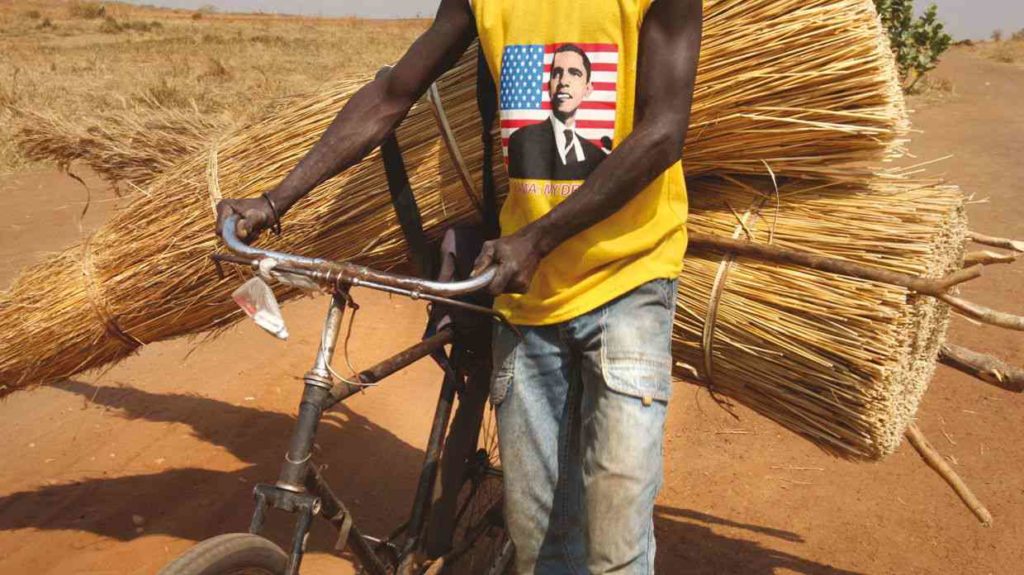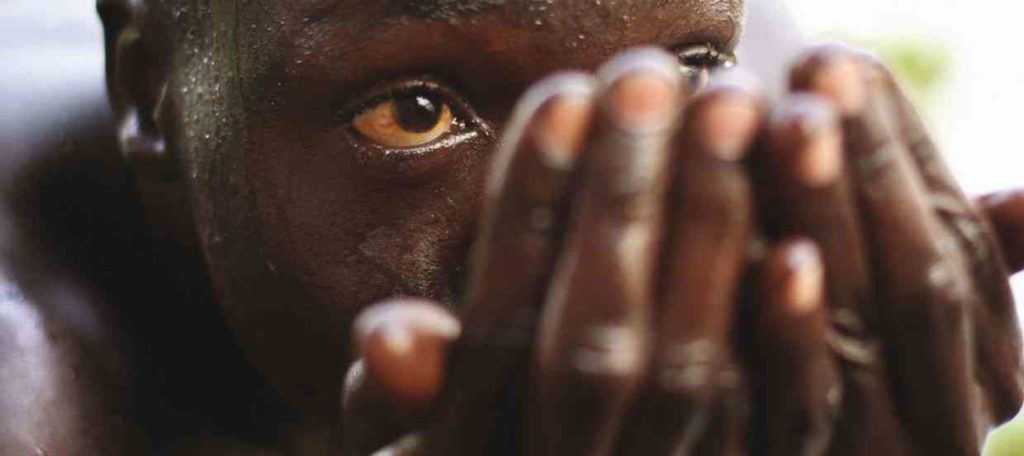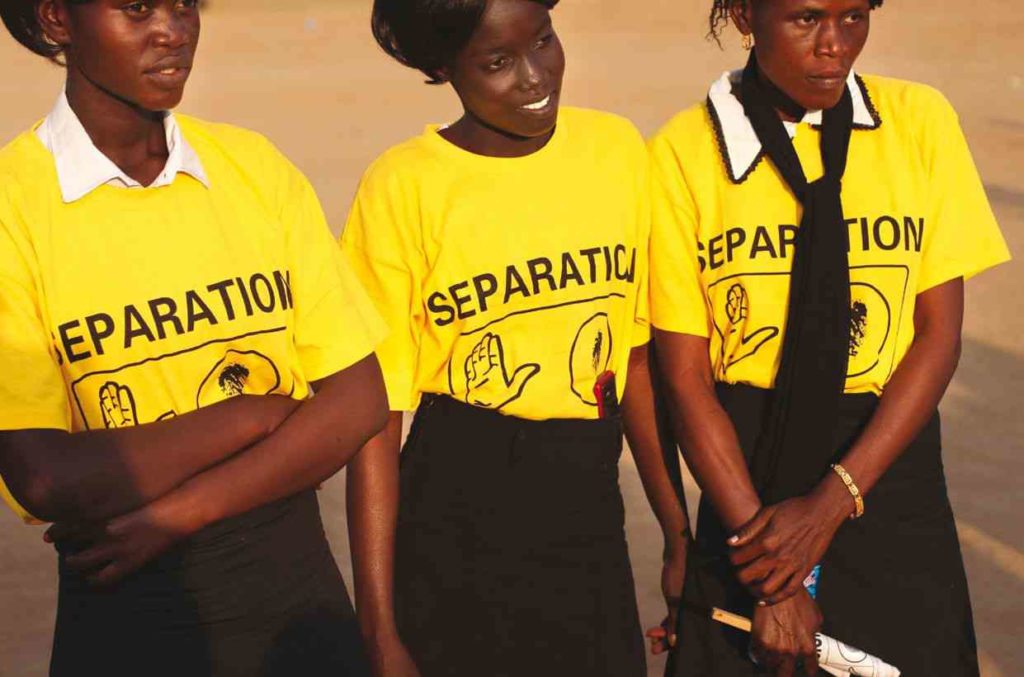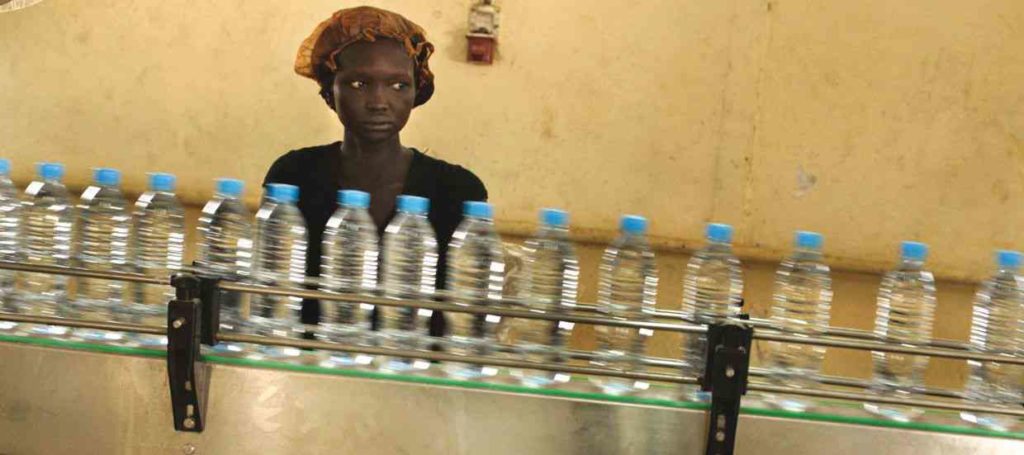Secession of South Sudan
The United States supports the independence of South Sudan and China controls its oil industry, but the most explosive issue in the Horn of Africa is access to water and the massive Nile River.
The Referendum Results
The January 9-16, 2011, referendum was a week-long carnival in South Sudan: flags were waving, patriotic songs were booming, people were hugging and laughing. Many voters were camping and queuing the evening before. Many came from the countryside with their cattle and children. Around 160,000 ‘southerners’ came back from the North to participate in the referendum. The South Sudanese spent the last 55 years as third-class citizens of the Arab-dominated northern capital of Khartoum. 90 percent of the voting population went to the polls. Of those 4 million registered voters, 98 percent backed secession. In July 2011, South Sudan becomes the 193rd country of the world.
When I finally voted, I thought my heart was going to burst […] This is what I have been fighting for all my life! This is something that made it all worthwhile.
Daniel Bol, 33, ex-member of the Sudan People’s Liberation Army (SPLA)
Prospects for the New State
Stipulated by the 2005 peace treaty signed between North and South Sudan ending 22 years of bloodiest civil wars since World War II, the referendum’s outcome was never in doubt. After Eritrea in 1991, South Sudan becomes the first African country to declare independence. In 2005, not many people believed the SPLA could pull off such a feat. Yet the ones who believed – among them the SPLA’s deceased leader Dr. John Garang – proved that as one of the world’s poorest and harshest places, South Sudan could become a new nation.
The secession of the South causes a reshuffling of both the regional and global geo-strategic players. Many observers claim that everything is in place for renewed conflict that could occur on a massive scale and consist of all the necessary elements for modern African warfare: Muslims against Christians, water and oil. 85 percent of all Sudanese oil is located in South Sudan, but all the refineries and terminals, as well as the key port of Port Sudan, are in the North. Sudan’s current set-up looks like a cause for war. The leading figures in the North and South are trying to make every assurance that they will reach an agreement. If war has exhausted even the leaders, then a non-aggression pact should come into effect. North and South could consolidate their interests and decide that their best option is cooperation.
China determines the tempo of the entire combustion process since most of Sudan’s oil business is run from Beijing. The United States lost the fight for Africa’s natural resources with its wars in Afghanistan and Iraq. Today, China imports 70 percent of Sudan’s oil. The Chinese will is obeyed regularly without question – this goes for the North as well as for the South. There is extreme irony in how economic opportunism is goading this region towards peace, and not war, for once.
Secession is welcome and long overdue but the rampant euphoria witnessed at every voting site may be hard to match with reality. As South Sudanese President Salva Kiir officially announces the birth of a new nation, his government will face great adversity with building the state it has been elected to govern. Most government officials are prominent SPLA members and the developmental, infrastructural, economic and humanitarian challenges are simply staggering: in South Sudan, a 15-year-old girl still has a greater chance of dying in childbirth than finishing school.
A Warm Welcome Home
At the end of 2010, South Sudan experienced a great influx of people returning from the North. An estimated 160,000 ‘southerners’ came back to take part in the referendum and/or to avoid possible repercussions by Khartoum. Their status in the North had been that of third-class citizens – sometimes on the level of ancient and colonial slaves. The South did not exactly greet them with open arms, but the southern authorities did need their votes. Many of these returnees were stranded – exhausted and starving – in Juba’s chaotic port. From Khartoum they came by boat, sailing in the devastating heat for over two weeks. Packed in with all their belongings, they had no fresh food or drinking water. Many caught malaria. In the background, SPLA members loaded weapons onto ships sailing for the northern border.
They told us we will have to go to the countryside – there is apparently no room for us in Juba. I’m still hoping they’ll help me study – I’ll study anything, anything!
Among the starving children and helpless elders lying on the dry river mud by the port, Paul Yoko, 28, says that his “journey took 12 days. It was a horrifying expe- rience. We slept on the floor, clinging to our things. We ate little and drank from the river. Many of us got sick. Worst of all, I think, were the mosquitoes.” Paul was travelling with twenty of his relatives. His father has two wives and children: “I spent the war in the South. I went to school and lived through the bombings. My father fled to the North. After the peace treaty was signed, he called and asked me to join him in Khartoum.” In the North, Paul tried to enrol at university, but he was rejected and went to Uganda to study: “I had no money and I was so lonely. I decided to return to Juba.” Paul had been loitering at the port for days.
One of the most vital problems that the nation-builders from Juba, the capital of South Sudan, will be forced to tackle is tribal relations. The southern tribes are traditionally very hostile to each other. In 2010, several thousand people were murdered in tribal warfare. In 2009, the SPLA forces nearly wiped out the notorious ethnic Shiluk group that lived in a little fiefdom by the Nile River. South Sudanese authorities accused them of collaborating with Khartoum – nothing short of a bloodbath ensued.
If South Sudan is to have any chance of succeeding as a nation-state, it will have to transcend its deeply entrenched tribalism that led British anthropologist, Sir Evans Pritchard, to claim that war was the only conceivable relation between two tribes. An integral part of Sudanese tribalism is Darfur. There is no doubt that the secession’s highest price will be paid by the population of Darfur, where the Sudanese President Omar al-Bashir and his reigning military oligarchy have almost concluded the first genocide of the 21st century.

The referendum’s defining mood was one of jubilation, but not everywhere was as idyllic as Juba. A parallel referendum was set to take place in the Abyei province to give the people a chance to decide whether it wished to join the North or South. Due to the highly compromised security situation and numerous logistical mishaps, the parallel referendum was postponed until a later day – and that may be indefinitely.
Abyei is one of the more oil- and water- rich provinces and saw immediate surges in fighting among the ethnic Dinka Ngok and nomadic Myseria groups. The members of Dinka Ngok wish to join the South, while the Arabized Myseria have strong ties to Khartoum. Fighting erupted when the nomadic Myseria group attacked first and were armed with weapons from Khartoum. Similar conflagrations are likely to flare-up in the Nuba Mountains that are being split in two by the secession.
Once more, reassurance is given by official figures. “No, there will be no more war,” said the South Sudanese Minister for Water Resources, Paul Mayom Akec. “Economic interests are bound to prevail. The Abyei province will settle down, too. No one can afford to make mistakes. I can assure you that Juba is in constant contact with Khartoum, and that the tone is far from hostile. We will reach a final agreement. All that is needed is a lot of tolerance.”
This is why our country has to be built around our mighty river for it gives life and then it takes it away, according to its will.
Paul Mayom Akec, South Sudan Water Minister
Water is Tomorrow’s Oil
Travelling down the Nile River offers little hope and the river shapes the politics of Africa. Water is becoming the new oil. The continent’s population is rapidly growing and the need for fresh water is enormous. Every year the Sahara Desert continues to grow further south. Many conflicts are fought along the encroaching desert’s edge of the Sahel. The more fortunate ethnic groups are fiercely protective of their traditional boundaries, while tribes fleeing further south have no choice of territory.

In South Sudan, 98 percent of the government’s budget comes from oil revenues. Oil was one of the main reasons for the Sudanese civil war between North and South. Khartoum had adopted the policy of mass killings to try to prevent the South from developing while simultaneously appropriating all oil reserves. When the 2005 peace treaty was signed, the two warring parties agreed to split the profit 50/50. In light of the South’s secession, a new agreement is being negotiated.
Taking into account China’s massive energy needs, the oil fields of South Sudan are estimated to dry out in the next fifteen years. Yet this is not something that weighs too heavily on the minds of Juba’s politicians and businessmen since South Sudan also possesses an abundance of the one natural resource that is sure to outrank oil. The future’s ultimate bounty and the fuel for potential conflicts is the water ways of the Nile River that split South Sudan down the middle.
The South Sudanese capital of Juba will develop into a global geo-strategic hub. South Sudan’s Minister for water resources, Paul Mayom Akec, asserts that “for now, oil keeps us going, but it is clear that water from the Nile is our future. The oil business is good for a few more years. After that, the people of the world – and I mean all over the world, especially in hot and dry places – will be talking about water scarcity.”
In his pleasantly air-conditioned office in Juba, Akec says that “so far, we’ve been forced to keep busy with pressing political issues, but after we declare our independence, things are bound to change. Water will become our first priority.” According to the Water Minister, South Sudan will become a farming country. It has everything it needs to feed its people. “I’ll go even further and say that our aim is to start exporting food. With food prices are going through the roof, this is not an opportunity we can afford to miss.”
In Akec’s view, all the revenues the government gets from oil should be rerouted into setting up the infrastructure for a water-based economy: “We’re quite determined to harness the Nile’s potential to generate power. We will build hydro-electrical plants and dams. The 1959 treaty does not allow that since it gave the river almost exclusively to Egypt and Khartoum. All these years it has been theirs to exploit as they saw fit. Agriculture makes up a third of the Egyptian economy, and the entire enterprise relies on the irrigation systems afforded by the Nile. Why shouldn’t we – or the Ethiopians – be allowed to benefit in the same manner? The 1959 treaty was a political decision, a colonial decision – and the price was paid by the poorest inhabitants of our continent and was the cause of many wars. This is why the treaty needs to be changed.”
The 6,671km Nile: the longest river in the world
- The Nile Basin is shared between 11 countries: Burundi, the Democratic Republic of Congo, Egypt, Eritrea, Ethiopia, Kenya, Rwanda, South Sudan, Sudan, Tanzania and Uganda.
- The Nile Basin drains over 3,349,000km2 which covers about 1/10 of Africa.
- The white Nile and the Blue Nile meet in Khartoum, Sudan, to form the Nile River.
- 15% of the water comes from the White Nile (Lake Victoria); 85% comes from the Blue Nile, Atbara and Sobat rivers in Ethiopia. The Nile River provides ~ 84 billion cubic meters per year.
- ~ 370 million people live in the Nile Basin countries; in 2030, the population is estimated to rise to 600 million.
Political unrest in Egypt and the independence of South Sudan changed the regional map. Moreover, signed by Ethiopia, Kenya, Uganda, Burundi, Rwanda, and Tanzania gives these upstream countries permission to use Nile waters that, under previous agreements, were denied direct usage of the natural resource for their people.
South Sudan – the massive Sudd swamps
About half the White Nile water is lost in the South due to evaporation. This has been a concern since European colonial times. In 1904 the proposed construction of the Jonglei Canal was to reduce losses, but change how the Nile is used.
Egypt – Complete Nile Dependence
The Nile provides 98% of Egypt’s freshwater. Egypt is ones of the most threatened countries by water shortage. Egypt’s population is over 80 Ethiopia, which also has a population of more than 80 million.
Ethiopia – the Water Tower of Africa
Annual rains in Ethiopia give around 123 billion cubic meters of surface water, which equals 1.5 times the annual of the Nile. Ethiopia only retains 3% of the water; most flows north to neighboring downstream countries. As one of the poorest countries in the world, only 5% of Ethiopian agricultural land is irrigated properly. Endemic hunger still affects 5-6 million people.
No Clue about Cultivation
“For hours and hours I stare into the river – almost every day. I can not stop marvelling at its potential. This is a river all of Africa could live off of,” says G. M. Lawrence, the owner of Equatorial Gumbo Farm, one of South Sudan’s largest farms. The young Kenyan was the first major investor in South Sudan’s agriculture. In 2009, most agricultural activity still revolved around hunting and gathering. “Tens of thousands of people died here from starvation. European colonizers and then Khartoum kept this place from developing. There is so much water and good soil – but for the last 30 years, the people had to rely on international aid. This made them lose their work ethic. There is plenty of work to be done on my farm and there are so few other jobs, so you’d expect to see hundreds of workers waiting at my door each morning, looking for work, but there are very few.”
Most of Mr. Lawrence’s applicants have no education. He teaches them the most basic practices to cultivate the land. Maintenance of material is a constant issue to growing grain and vegetables. Six days before our visit in January 2011, the main water-pump broke down at one of his farms. Since Juba has no spare-parts shop or any reliable repairmen, he had to send an apprentice to Nairobi. Transport of heavy machinery is only possible over land – the delays were so long that the year’s entire crop was in peril. “This experience is all you need to sum up the conditions in South Sudan,” Lawrence said in frustration. “I live next to the river, but due to general incompetence my fields are drying up. No one offered to come to my aid. The governmental institutions keep ignoring me. I tell you, the Ministry of Agriculture here doesn’t have a clue about cultivation. They probably see my modern business approach and the fair deal I offer my workers as a threat to their privilege.”
Lawrence is convinced the key to the future is water: “Forget the oil. South Sudan needs to build its economy on water. What oil there is, well… most of it is owned by the Chinese. The refineries and terminals are mostly manned by foreigners, so locals here do not benefit at all. In a perverse sense, oil is actually a hindrance to development. The foreigners who took over brought no education or work ethic. The civil war destroyed generations of farmers. They either hid or were swept into the conflict, while the soil rapidly deteriorated. Now a fresh momentum is building up. At least in Juba the people are starting to realize what so much water and fertile soil can bring. In other parts of the country, they’re still burning thickets to make it easier to shoot an antelope. That’s been agriculture until now.”

All Arrangements Must Go
Ancient Egyptians, as recorded by Herodotus, claimed their country was the gift of the Nile. If that is so, then Egypt is a gift from Ethiopia, where around 85 percent of the Nile waters emanate. The Ethiopian Prime Minister, Menes Zenawi, repeated that phrase. Like Minister Akec, Zenawi was quick to promise the rise of new hydro-electric plants and dams. Over the past decade, Ethiopia built five large dams along the Blue Nile. As if that did not enrage Cairo enough, Addis Ababa also launched the construction of a tremendous hydro-electric plant worth $1.4 billion to provide Ethiopia with long-term energy security which is a key strategic advantage in a very dry region. The Ethiopian architect and ecologist, Binyam Tekle, claims that Egypt is behind the radical increases in food prices in the Horn of Africa that could lead to a massive crisis.
If Egypt doesn’t back down,” Tekle says, “and the treaty isn’t re-negotiated, then we’re headed for serious trouble. Ethiopia owns 85 percent of the river, but because of Egypt all of eastern Africa can only use one percent of the water.”
The 1959 treaty was the reason Egypt – Khartoum’s ally – was opposed to South Sudan’s independence. Cairo’s ill will has long been adopted as a given, so the diplomatic cables published by WikiLeaks came as no surprise. According to these documents, Egyptian diplomats lobbied intensively for the U.S. to help them postpone the referendum in Juba. Now that the referendum passed, Egypt is promising South Sudan greater financial and technical help with anything pertaining to the Nile. This is meant to mollify South Sudan, whose President Salva Kiir recently met with the Ugandan leader, Yoweri Museveni, to discuss measures for weakening Egypt’s dominion over the river.

“Every existing arrangement concerning the Nile is outdated and part of our colonial inheritance,” the Water Minister Akec claims. “In the last fifty years, Africa has changed and there has been too much exploitation. Along the Nile, everybody deserves their fair share of drinking water, fish, transport and energy. Water is a gift and it must be shared.” But this may be rather utopian. Mwambustya Ndebesa, a professor of history at the Makerere University in Uganda’s capital, Kampala, claims that, sooner or later, the region will be awash with blood. “What we have here is an explosive mixture of the world’s increasing demand for oil, Islamic and Christian fanaticism, as well as unsolved questions pertaining to the Nile. There will be trouble in the near future, and there will be lots of it.” More than 30 years ago, the former Egyptian President Anwar Sadat said: “The only thing that could drag Egypt back into war is water.” That same concern was echoed by the former Egyptian Foreign Minister and later Secretary General of the UN, Boutros Boutros Ghali. The wars to come in Africa and Middle East will be about the natural resource of water.
Investing in the Nile
One of Juba’s most promising economic activities is the production of bottled water. In the new country’s capital – one of the fastest growing cities in the world – there is no public water system. Most of the people obtain their drinking water directly from the filthy Nile. In Juba, there are currently six companies specializing in bottling water. Most of these companies – like most companies in South Sudan – are owned by well-compensated foreign investors: for the first five years of operation, all revenues are tax-free. The one locally owned company that has been able to hold its own against the wealthy foreigners is the Yanyyom Mineral Water and Beverage Factory. The company is located on the near the Nile and employs 35 workers. At their modest headquarters, the Managing Director, Peter Majok, said his company has to pay four different kinds of taxes.
“We are able to bottle 27,000 litres of water per day,” he said. “Not a lot, but our capabilities are limited. In general, the supply of bottled water here cannot keep up with demand. We can sell our entire stock without any marketing. We started operating in November 2008 and grew quickly. This is typical for any bottling plant in Juba. Our only real investor is the Nile. We have at our disposal unlimited quantities of quality water, and it’s virtually free. Right now, the market is thoroughly deregulated, but we do have an advanced laboratory to keep watch over our product’s safety. So far, every test came back fine.”
According to Majok, most people are used to drink straight from the river. “Bottled water is too expensive. They simply can’t afford it. The authorities really need to step in and set up subventions to bring the price down. Everyone would benefit. Poor people aren’t about to spend half a dollar on a bottle of water – not when they can go drink from the Nile and spend the money on food instead. The medical consequences of drinking from the river are only gradual, and the gratification is instantaneous! So we need to do everything in our power to raise awareness. The Nile is getting dirtier every year. If nothing changes, we are quite likely to have another epidemic.”

Thirty kilometres south of Juba, fishing is a meagre livelihood. A fisherman named Maigur Mogy, 48, steered his canoe into a safe muddy harbour at an islet in the middle of the Nile where he and four of his friends live. From his ancient fishnets he collected a few scrawny fish he managed to catch in the oily and dark river. He threw the fish into a pot and began preparing a thick heavy broth. Meanwhile, his friends were mending their nets. A tiny transistor radio was blasting patriotic songs. Maigur Mogy came here because he got fed up with the war: “All I wanted was peace. The authorities leave me alone here – even the SPLA has stopped bothering me.” Mogy’s nephew Rogers, 24, was a former child-soldier and fought in Sudan, then in Uganda and in the Democratic Republic of Congo:
A few months ago I was travelling south on my motorbike to meet some relatives. I stopped by a small well in the middle of an entirely dry area. I pumped and pumped at the handle, and eventually a little water came up. As I was pouring it into a bottle, I noticed a black cobra lying there on the ground beside me. It must have come over while I was busy pumping. I knew it was thirsty, so I backed away. The cobra drank from the little puddles I made by the well, then it slithered back to the brush.
In the comfortable shade offered by a great mango tree, the fishermen were finishing off their meal. The Nile flowed lazily towards the Mediterranean. The islet in the middle of the river was warm and breezy, and all the wars seemed far away.